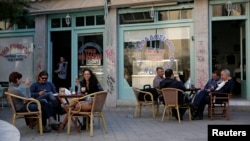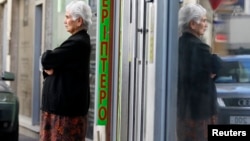NICOSIA —
In the end it was hardly even a stroll, let alone the widely predicted run on the banks of Cyprus.
Commentators had been confident that as soon as the banks reopened on Thursday at noon after Cyprus signed a rescue deal with the European Union to stave off national bankruptcy, there would be scenes of chaos.
The experts were right, but it wasn't the Cypriots causing the pandemonium.
Television crews from around the world crowded into tiny Eleftheria Square in central Nicosia, the convenient location of two of the capital's main banks.
If there were a dozen Cypriots waiting patiently to make a withdrawal, there were probably twice as many cameramen, each one as frenzied as the local people were calm.
Reasons for this fortitude are not hard to find in conversations with residents of Nicosia, a sunny and welcoming city with a vibrant cafe culture.
The Greek Cypriots describe themselves as more laid back than their cousins in Greece, where the reaction to the austerity decreed in their own EU rescue deal was mayhem on the streets of Athens.
While a bomb did explode on the day the Cyprus banks ended their two-week closure, the explosion actually happened in Greece.
Cypriots say that they have endured worse, harking back to the war in 1974, when the island was divided after a Turkish military invasion.
Jean Kelly-Christou, editor-in-chief of the Cyprus Mail, the island's oldest newspaper, said people were drawing on the lessons of the economic crisis that followed the war.
"I think most people are being pragmatic about it and understand that demonstrations and anger might make things worse," said Kelly-Christou, who is Irish.
Strict Regime
A strict regime of restrictions on bank transactions, including a daily limit of 300 euros on withdrawals, has been imposed this week, in what is commonly described as an unprecedented move.
Unprecedented in the short history of eurozone bailouts perhaps - but Cypriots recall they had to endure years of currency controls after the 1974 war.
In any case, much of the anger in Cyprus was probably expended before the deal was done in Brussels on Monday.
An initial version envisaged levying a tax on all bank deposits, large and small, and that infuriated small savers on the island. The final agreement, which only hit those with more than 100,000 euros in the bank, was better received.
The restrictions on bank transactions may also have helped calm the mood. After all, if people can't withdraw more than 300 euros a day, it is difficult to have a full-scale bank run.
Most people do not have 100,000 euros in the bank in any case and were taking comfort from the fact that deposits below that level are protected by insurance.
Many of those waiting in line for the banks to reopen were in fact elderly people who had run short of ready cash. They said they were uncomfortable with bank cards and so unable to use the ATMs that had remained in operation throughout.
Others probably realised that they had just as much chance of getting their money later rather than on day one.
"We were planning to take our money out but we're going to wait ... it's going to be chaos today," Constantina Economidou, a civil servant, said on Thursday.
High Finance
Others were equally resigned, or perhaps numbed by the sensation that there were matters of high finance under way which they could not do much about.
"The government hasn't told us exactly what's happening so people don't know how to react," said Patra Michaelides, 45, a teacher. "We're at a loss. Should I be hopeful or worried?"
Theodora Kyprianou 72, who owns a souvenir shop stacked high with unsold T-shirts, hats and souvenirs of Cyprus, said the general calm when the banks reopened did not surprise her.
"We're civilized here - what did people expect? The problem isn't big - it's very big. But what can we do about it," she asked with a shrug.
There is also national pride at work. President Nicos Anastasiades praised his compatriots for their maturity and responsibility, while ordinary people said they had posted messages on Facebook urging Cypriots not to give the foreign media the satisfaction of seeing the country unravel.
"You may have the euros, but we have the culture," said the front page headline in the daily Politis, above photos of people queuing outside banks.
There have been street protests, but they have been limited in scope and certainly not violent.
"Cypriots are non-violent by nature. Just take a look at the vandalism and street protests in Greece. You have none of that here. This is a completely different mentality," said political scientist Hubert Faustmann of the University of Nicosia.
He said Cyprus was a small country, and if you took to the streets in protest, "you could be taking it out on your neighbor's brother-in-law."
"Also, there is a realisation that deep down, things were not perfect here," he said of a country whose overgrown banking sector was eight times the size of its economy.
Commentators had been confident that as soon as the banks reopened on Thursday at noon after Cyprus signed a rescue deal with the European Union to stave off national bankruptcy, there would be scenes of chaos.
The experts were right, but it wasn't the Cypriots causing the pandemonium.
Television crews from around the world crowded into tiny Eleftheria Square in central Nicosia, the convenient location of two of the capital's main banks.
If there were a dozen Cypriots waiting patiently to make a withdrawal, there were probably twice as many cameramen, each one as frenzied as the local people were calm.
Reasons for this fortitude are not hard to find in conversations with residents of Nicosia, a sunny and welcoming city with a vibrant cafe culture.
The Greek Cypriots describe themselves as more laid back than their cousins in Greece, where the reaction to the austerity decreed in their own EU rescue deal was mayhem on the streets of Athens.
While a bomb did explode on the day the Cyprus banks ended their two-week closure, the explosion actually happened in Greece.
Cypriots say that they have endured worse, harking back to the war in 1974, when the island was divided after a Turkish military invasion.
Jean Kelly-Christou, editor-in-chief of the Cyprus Mail, the island's oldest newspaper, said people were drawing on the lessons of the economic crisis that followed the war.
"I think most people are being pragmatic about it and understand that demonstrations and anger might make things worse," said Kelly-Christou, who is Irish.
Strict Regime
A strict regime of restrictions on bank transactions, including a daily limit of 300 euros on withdrawals, has been imposed this week, in what is commonly described as an unprecedented move.
Cyprus Bailout
Cyprus Bailout- Agreed to on March 25
- Worth $13 billion
- Keeps Cyprus in the eurozone
- Closes the island nation's second largest bank - Laiki Bank
- Laiki accounts larger than $130,000 will be moved to a "bad bank" and used to raise bailout money
- Laiki accounts with less than $130,000 euros will be moved to Bank of Cyprus
- Bank of Cyprus will be restructured
In any case, much of the anger in Cyprus was probably expended before the deal was done in Brussels on Monday.
An initial version envisaged levying a tax on all bank deposits, large and small, and that infuriated small savers on the island. The final agreement, which only hit those with more than 100,000 euros in the bank, was better received.
The restrictions on bank transactions may also have helped calm the mood. After all, if people can't withdraw more than 300 euros a day, it is difficult to have a full-scale bank run.
Most people do not have 100,000 euros in the bank in any case and were taking comfort from the fact that deposits below that level are protected by insurance.
Many of those waiting in line for the banks to reopen were in fact elderly people who had run short of ready cash. They said they were uncomfortable with bank cards and so unable to use the ATMs that had remained in operation throughout.
Others probably realised that they had just as much chance of getting their money later rather than on day one.
"We were planning to take our money out but we're going to wait ... it's going to be chaos today," Constantina Economidou, a civil servant, said on Thursday.
High Finance
Others were equally resigned, or perhaps numbed by the sensation that there were matters of high finance under way which they could not do much about.
"The government hasn't told us exactly what's happening so people don't know how to react," said Patra Michaelides, 45, a teacher. "We're at a loss. Should I be hopeful or worried?"
Theodora Kyprianou 72, who owns a souvenir shop stacked high with unsold T-shirts, hats and souvenirs of Cyprus, said the general calm when the banks reopened did not surprise her.
"We're civilized here - what did people expect? The problem isn't big - it's very big. But what can we do about it," she asked with a shrug.
There is also national pride at work. President Nicos Anastasiades praised his compatriots for their maturity and responsibility, while ordinary people said they had posted messages on Facebook urging Cypriots not to give the foreign media the satisfaction of seeing the country unravel.
"You may have the euros, but we have the culture," said the front page headline in the daily Politis, above photos of people queuing outside banks.
There have been street protests, but they have been limited in scope and certainly not violent.
"Cypriots are non-violent by nature. Just take a look at the vandalism and street protests in Greece. You have none of that here. This is a completely different mentality," said political scientist Hubert Faustmann of the University of Nicosia.
He said Cyprus was a small country, and if you took to the streets in protest, "you could be taking it out on your neighbor's brother-in-law."
"Also, there is a realisation that deep down, things were not perfect here," he said of a country whose overgrown banking sector was eight times the size of its economy.








